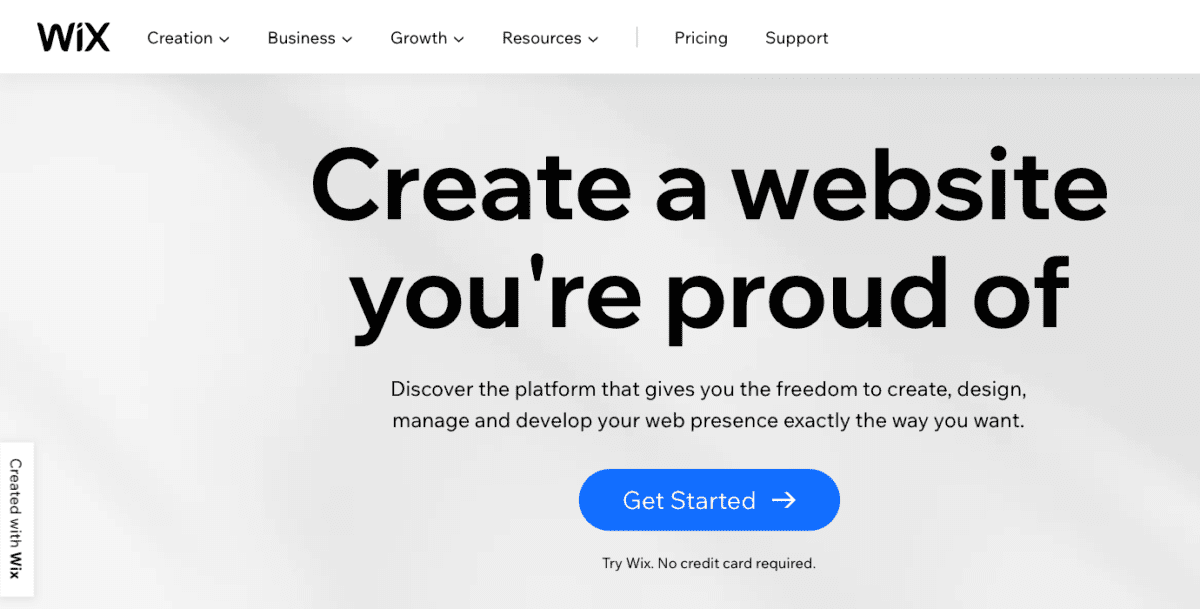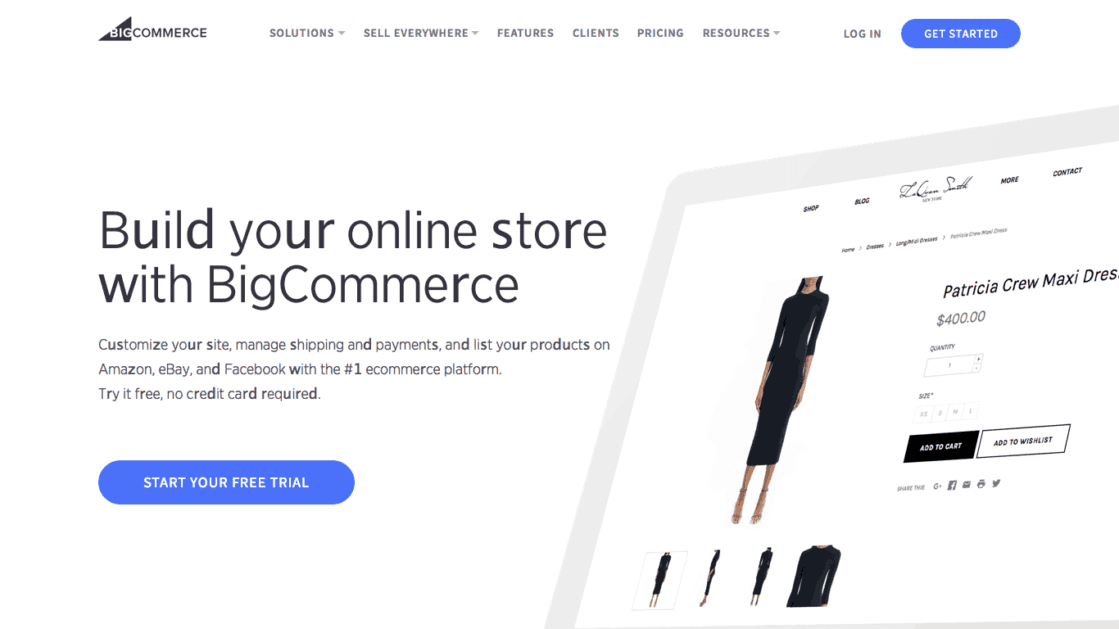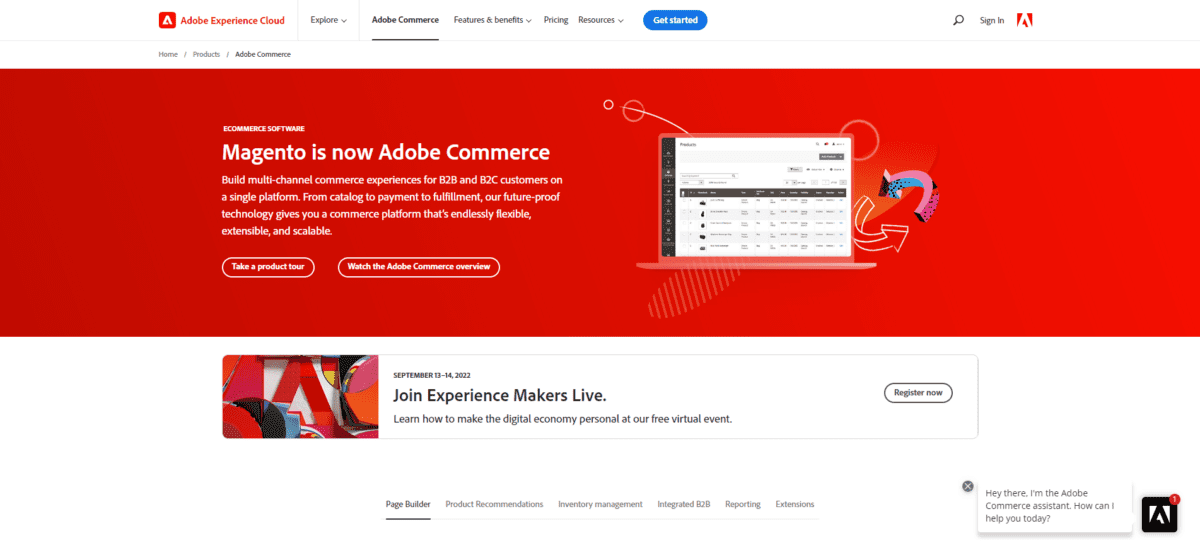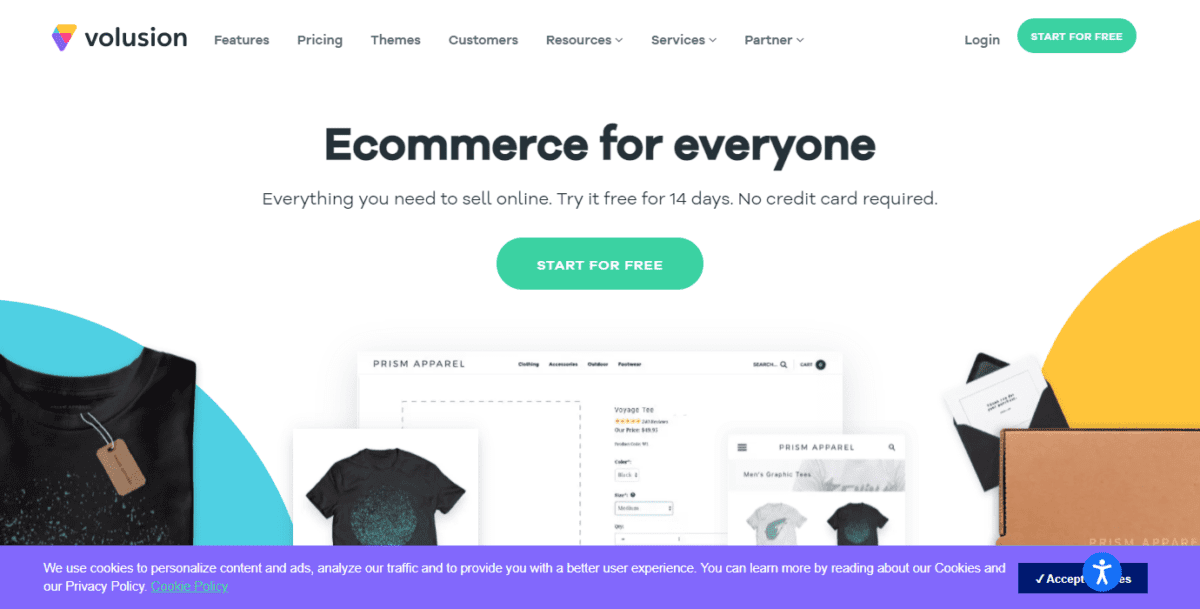Whether you’re just getting started or looking to make a change, choosing the right ecommerce software solution can have a lasting impact on the success and potential of your online business. The platform you choose will serve as the foundation of your website, which can be a huge benefit or a severe limitation.

Fortunately, there are many platforms to choose from so you can find a good fit for your website. Ecommerce software solutions can be specifically designed for building digital storefronts or website builders with an option for managing products and payment processing.
In this article, we will talk more about what ecommerce software can do and give you the top recommendations to suit your business needs.
What Is Ecommerce Software?
Ecommerce software refers to platforms designed to facilitate the creation and management of an online store. Rather than creating a website from scratch, or even using a website builder or CMS to create one, ecommerce software has everything you need to build your own digital store without unnecessary steps or options.
It is often a balancing act when choosing between flexibility and ease of use, with a custom website with limitless potential on one end of the scale and simple web store builders like Volusion on the other. While some platforms allow you to set up a basic ecommerce website in a matter of minutes, your business may outgrow the restrictions of that platform, limiting your options or requiring the Herculean task of migrating to a new platform.
As such, it is crucially important to give honest consideration to your company’s future when choosing an ecommerce software solution. If you only plan to offer a few products on a basic website, one of the simpler solutions can have you taking orders within the day. However, if you have a lot of ideas and hope to grow a unique and massively successful ecommerce marketplace, you will want to choose a platform that can scale with your growth.
What You Should Look for in Ecommerce Software Solutions
There are many different factors to consider when comparing ecommerce software solutions. It is not as simple as comparing ease of use with customization, and many options exist.
It may come down to a few similar solutions that differ in only subtle ways. Other factors, like price or knowledge of coding, may rule out some options from the start. Just be far-sighted in your decision, as saving a few bucks now or thinking you probably won’t use a certain feature may cost you much more in the future when facing a costly migration or limited website functionality.
Here are some factors to consider as a minimum. Some of these categories will carry more importance for your company depending on your needs and wants, so weigh the options carefully.
Ease-of-Use
Again, depending on the goals and outlook of your ecommerce store, ease of use can be a major determining factor. Some platforms benefit from coding experience, or at least technical knowledge, which may be a deal-breaker for many entrepreneurs coming from more of a business, as opposed to IT, background.
An easy-to-use software solution can save you a lot of headaches when building your first digital storefront, so long as that ease doesn’t come at the cost of key features and future options. In most cases, a little more time and effort in your initial investment is worth a higher ceiling as your company grows and evolves.
Customer Support
Especially for those new to website building and ecommerce operations, you will likely encounter some obstacles you can’t easily solve on your own. Simple questions about how the ecommerce software works are probably available through the company, guides, or online forums, but support beyond that may not always be offered.
Some platforms offer additional support (in some cases free, in other cases at a premium), that may even include developers and IT professionals willing to troubleshoot issues with your website when they inevitably arise. This can be invaluable for making your vision come to life, as well as making repairs if your website goes down.
Prompt, professional customer service can be crucial for your website and customer experience.
Streamlined Checkout
Some ecommerce software solutions offer more payment and checkout options than others. Having more customization is generally better, though if you are limited in options, you want to streamline checkout as much as possible.
A cumbersome checkout process or bad UX can result in lower conversion rates and many abandoned carts. The last thing you want is to invest time and money into an ecommerce shop, only to lose sales because of a poorly designed checkout process. Compare your options before making a final decision, and consider shopping cart software and checkout processes as one of the first focuses for your web store.
SEO Capabilities
In addition to some platforms offering SEO-specific tools and add-ons, each has inherent advantages regarding search engine friendliness. For example, Shopify has inherently lower search engine optimization potential than WordPress due to several factors like the ability to create keyword-heavy pages, backend page loading speeds, and crawlability.
WordPress even offers a number of SEO plugins that can help you optimize your content for better search results. Also, consider Core Web Vitals when deciding on your platform.
Web Hosting
Registering a URL and setting up hosting can be a little technical if you haven’t done it before. Some ecommerce platforms include hosting and domains in their service, which can be extremely convenient for the business owner.
These services may come as an added expense but are often worth it for new webmasters. Be sure you are receiving a standalone domain with whatever option you choose, as the limitations of a free subdomain will cost you in the long run.
Multi-channel Selling
Many ecommerce stores are not exclusively online. The global COVID-19 pandemic pushed many brick-and-mortar stores to develop an online presence in addition to their physical storefronts. Another common sales channel is business fairs, where companies and crafter sell their goods from booths.
Some ecommerce solutions include a POS system that can be used in person or online. Others are able to integrate with third-party inventory management tools so you can track your stock from multiple sources and avoid double-selling. If you have physical stores in addition to your online presence or sell across multiple channels like eBay, Amazon, or other marketplaces (including live events), you’ll want an ecommerce software solution that supports multi-channel sales.
Top Ecommerce Software for 2024
Countless new ecommerce platforms are popping up every day, riding the wave of companies rushing to build an online presence after the global pandemic. Don’t be sold on convincing claims or promises from new companies, trust the established platforms used by your favorite brands.
Here are the top ecommerce software solutions to consider.
Shopify

Shopify is the easiest way to start an ecommerce store. It offers a complete solution for merchants who want to create a beautiful storefront, sell products online, and process payments. It is also a great option for dropshipping.
The user-friendly platform lets online store owners build powerful stores with sufficient customization. They can track customers, manage inventory, and accept payments, all from one place. Especially for those just starting out, Shopify is an excellent option.
Wix Stores

Wix is an easy-to-use site builder that allows users to create beautiful websites without coding experience. You can easily add themes and plugins (additional modules) to customize your site further.
While Wix is free for personal use, you’ll need to pay to access advanced features such as unlimited pages, domain hosting, and email marketing according to their pricing plan. Wix also has a relatively low ceiling for custom web design options.
BigCommerce

Enterprise-level technology companies are the target of BigCommerce’s online commerce software. The platform is very robust and comprehensive, which means it can handle large-scale enterprises’ needs – but may be too much for any small business. It’s also a bit more rigid in regard to customization.
As far as ecommerce features are concerned, BigCommerce supports cross-border sales for international businesses, social marketing, and third-party marketplaces. It also has strong ecommerce SEO. If you have big plans or are outgrowing your current ecommerce software solution, check out BigComerce.
Adobe Commerce (formerly Magento)

Formerly known as Magento, Adobe Commerce is a popular digital commerce solution that has been around for over a dozen years. Adobe’s acquisition of Magento brought some updates to the software, building upon the strong bones of this popular website builder.
Adobe Commerce is a flexible ecommerce platform that allows you to create a fully functional storefront without having to spend hours integrating your own online shopping cart solution. You can easily add additional payment gateways, shipping options, and currencies.
WooCommerce

WordPress is a content management system (CMS) that powers over 40% of all websites on the internet. One of the biggest benefits of WordPress is the number of third-party plugins available to users.
Of those plugins, WooCommerce is one of the most popular. This all-in-one ecommerce solution can transform any website into a digital store with only a few clicks.
If you aren’t afraid of some technical configuring or want the flexibility that comes along with that, a WooCommerce shop offers tons of options. You’ll also have access to a massive library of additional plugins you can use to customize and optimize your online store.
PrestaShop

If you’re just getting started and consider yourself tech-savvy, PrestaShop is worth a look. The open-source ecommerce software is very flexible and customizable–a pro and a con on its own.
On the plus side, you get full control over how your site looks and functions. On the downside, you’ll need to figure out everything from setting up your own server, to managing your privacy and security settings. And if you decide to go with a third-party host, you’ll need to do all those tasks on top of figuring out what kind of hosting plan works best for you.
As far as ecommerce goes (and we’re talking about an online store), PrestaShop covers the essential features. They include inventory management, online payment options, and multiple shipping options.
Squarespace

Like Wix, Squarespace uses a drag-and-drop interface that is easy for beginners. However, Squarespace wasn’t originally built as an ecommerce platform. It was a website builder that added ecommerce features, so some of these tools feel like they were an afterthought. There are only two payment integrations, as an example.
Squarespace requires a decent amount of time for setup, but this also allows you to customize it the way you want. While you won’t have as much freedom as you would with WordPress, it is a good balance for those who want more flexibility in their design.
Squarespace has some nice inventory tracking features, as well. You can upgrade your plan to be able to sell gift cards and subscription-based products.
GoDaddy

GoDaddy is a popular website builder that also provides an online commerce solution. It utilizes AI technology to help users create custom sites quickly and easily.
While GoDaddy offers a fairly intuitive solution for getting started, it lacks some customization and scalability to be a good choice for many companies. However, for small or simple operations, this solution can be an easy one with basic CRM and ecommerce tools.
Volusion

Volusion offers an easy-to-use interface for creating a storefront. Once you’ve built your site, you’ll have access to various tools to help you sell online. These include order processing, shipping management, tax calculations, and inventory management.
Volusion doesn’t offer any advanced customization options. In addition, you’re limited to using prebuilt templates. But these templates do allow you to get started quickly. And if you decide to switch providers later, you won’t lose your data because they keep everything in the cloud.
Amazon

While Amazon once was only an online marketplace for promoting and selling products, it has since grown into a full-fledged eCommerce platform. Now you can use Amazon to create your own branded storefront. While it gives you access to millions of potential customers, it’s also dependent on the ever-changing policies and restrictions Amazon sets. This could result in a frustrating lack of freedom in your ecommerce design.
That being said, creating an Amazon store is a great way to supplement your current business channels. With Amazon, you can reach new customers and grow your brand awareness. Over time the hope is that they begin buying from you directly so you can cut out Amazon’s associated costs and restrictions.
Shift4Shop

Formerly 3dcart, Shift4Shop offers a robust, free option for businesses who need an online selling solution. It does not have as extensive ecommerce functionality as some other options on this list, but you can set up an online shop for your business quickly.
Its API allows integration with third-party applications, allowing lots of customization potential. It offers hundreds of features out of the box, including templates to create and design your digital store with ease.
PinnacleCart

PinnacleCart is a great choice if you’re looking for a powerful e-commerce solution that offers a lot of flexibility. You can easily customize your store with various features, including a customizable checkout process, multiple payment options (such as credit card payments and PayPal), and a robust inventory management system and ERP.
In addition, the platform comes with a number of useful SEO features, including Google Analytics integration, product reviews, and social media sharing capabilities. However, the lack of mobile compatibility and limited third-party support may limit its appeal to certain users.
Ecwid

Ecwid is an online commerce software that allows merchants to sell their products online. With features such as online payments, product catalogs, customer support, and marketing tools, Ecwid provides ecommerce businesses with everything they need to start accepting orders today!
Ecwid is free to use and even integrates with social media and marketplaces like Amazon. It also has a POS system for in-person transactions, making it a flexible solution for many businesses. If you don’t mind using a less popular ecommerce platform with a strange name, Ecwid has a lot to offer!
Benefits of an Ecommerce Solution
Building a website from scratch is like reinventing the wheel. Unless you have a unique concept in mind that requires a custom build, using an ecommerce platform can save you untold amounts of time and effort to get your shop up and running.
Most of these platforms offer developer and troubleshooting support if you run into any problems, whereas you would be on your own if a custom-built website suddenly goes down. Some ecommerce software even provides hosting solutions to save you the trouble of registering a domain and setting up a server.
Lastly, many popular ecommerce platforms offer a ton of apps, marketing automation, and third-party integrations to save you time and effort growing your website. Rather than reinventing multiple wheels, like a seamless shopping cart, automated email marketing, or accounting software, just install a pre-made plugin to handle it for you.
FAQs
Which Ecommerce Software Solution Is Right for Your Business?
There is no best ecommerce platform for every company. Factors like the size of your site, the goals of your organization, and the nature of your online business will all determine which services are a good fit for you.
You need to take a realistic look at your business and industry outlook to decide if a platform can scale with your company. Failure to make an accurate assessment may lead to outgrowing your chosen platform, which will limit your option and set a ceiling on your success and profitability. Research your competitors to see what platforms they use and consider what you do and don’t like about their sites. You can also look up reviews and ask for a demo to learn more about the frontrunners you are considering.
Then look at the popular ecommerce software solutions listed above to see if any of them sounds like a match. From there, you can research other companies who use the platform to see if their websites are appealing and similar to the vision you have for your brand.









